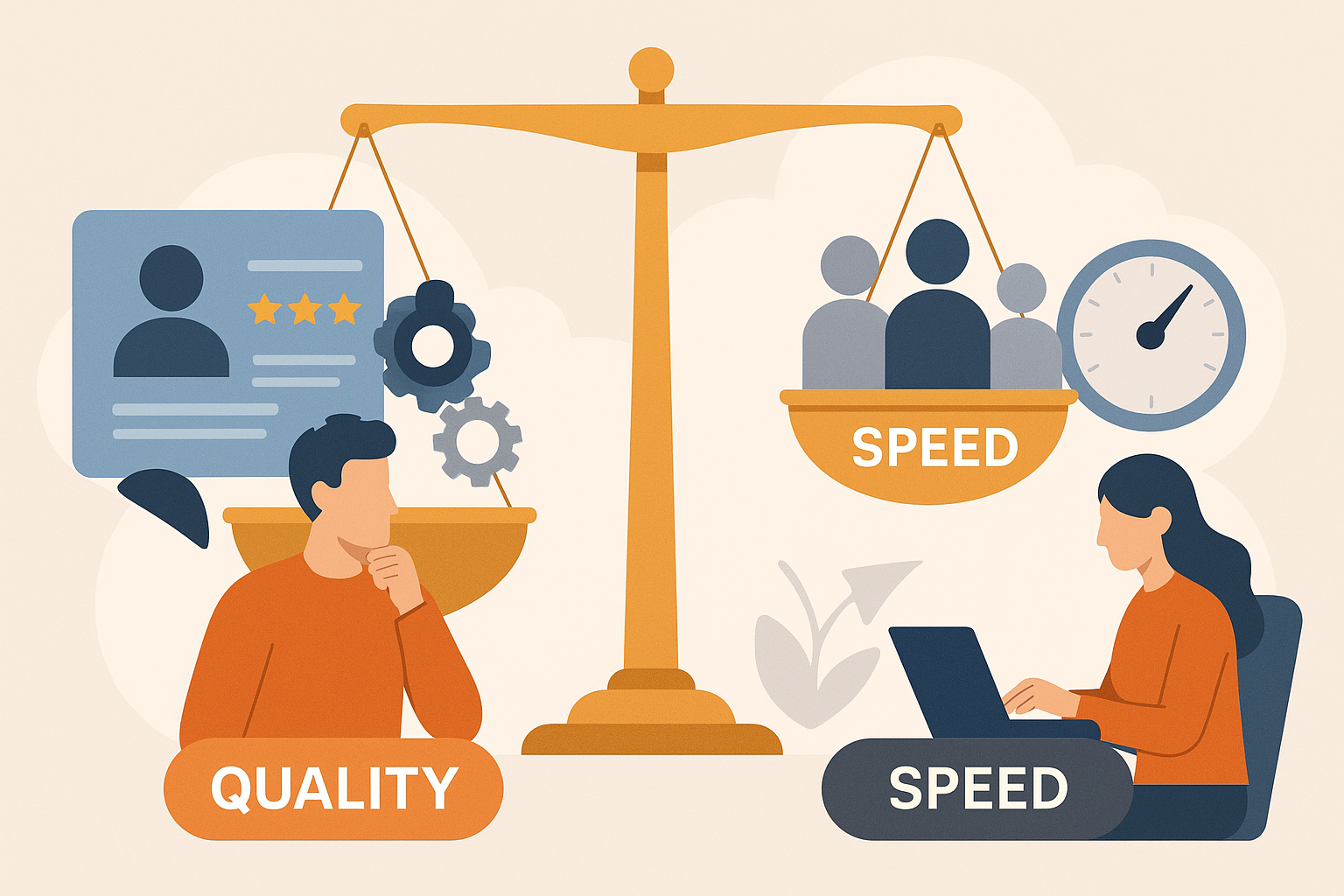What's in this article?
The eternal debate between lead quality and engagement speed significantly impacts sales optimization strategies. This discussion delves into the merits of prioritizing the caliber of leads against the urgency of engagement. In the multifaceted world of sales, both elements hold critical importance, yet finding a harmonic balance remains essential for maximizing sales success.
The High-Quality Lead Approach
High-quality leads are characterized by a strong potential for conversion and customer retention. By focusing efforts on fewer, but more promising leads, sales teams can enhance efficiency and outcome predictability. Tools like predictive analytics and AI-driven lead scoring have redefined how businesses identify such promising leads. These technologies control for variables ranging from purchase intent to interaction history, allowing sales teams to prioritize leads that are most likely to convert. By investing in lead quality over sheer quantity, companies often enjoy higher conversion rates, improved customer retention, and heightened salesperson efficiency.
Speed-to-Lead Strategy
In contrast, the speed-to-lead approach is founded on rapid engagement, which is often key in capturing the interest of prospects before competitors can get involved. This strategy is based on the principle that the sooner a sales representative engages a lead, the greater the likelihood of converting that lead into a customer. This sense of immediacy is especially crucial in industries characterized by short sales cycles or high competition. Implementing automated response systems and using real-time lead routing to ensure swift engagement can give companies a competitive edge, enabling them to capture potential customers’ attention swiftly.
Balancing Quality and Speed
For most businesses, the optimal strategy lies not solely in choosing one approach over the other, but in striking a balance that maximizes both lead quality and engagement speed. This equilibrium can be achieved through the integration of sophisticated sales technologies, including AI lead scoring systems and real-time CRM integrations. These systems ensure that high-quality leads are not only prioritized but also engaged promptly and efficiently. Key considerations in maintaining this balance include aligning technology capabilities with sales team strengths and continually monitoring and adjusting lead handling strategies based on performance metrics.
Best Practices in Sales Optimization
- Data-Driven Decision Making: Regularly use data analytics to assess lead quality and adjust engagement speed strategies according to insights derived.
- Continuous Training and Optimization: Equip sales teams with the necessary skills to handle both high-quality leads and dynamic lead environments. This includes regular training sessions and strategy optimizations.
- Technology Integration: Utilize CRM systems and AI tools for efficient lead distribution and management. The integration of these technologies should enhance speed without compromising lead quality.
FAQ
1. How does prioritizing lead quality affect conversion rates?
Prioritizing lead quality generally results in higher conversion rates because sales efforts are concentrated on prospects most likely to purchase, reducing resources spent on leads with lower intent.
2. What are the benefits of a speed-to-lead strategy?
A speed-to-lead strategy allows companies to engage prospects immediately, increasing the chances of conversion by reducing the window for competitors to engage the same leads.
3. How can businesses effectively balance lead quality and speed?
Businesses can strike a balance by leveraging AI tools that score leads based on quality while simultaneously ensuring rapid response times through automated systems for lead engagement.
4. Why is data-driven decision-making important in sales optimization?
Data-driven decision-making empowers businesses to make informed decisions, optimizing sales strategies based on concrete insights and proven patterns rather than assumptions.
5. How does AI integration facilitate sales optimization?
AI integration facilitates sales optimization by providing powerful tools for lead scoring, real-time insights, and automated processes, which together enhance both lead quality assessments and engagement speed.
Transforming Sales with Integrated Approaches
Effective sales optimization requires more than just choosing between quality and speed; it demands a dynamic integration of both. For businesses seeking to refine their sales strategies, integrating AI-driven lead management systems is a logical next step. These systems ensure that high-quality leads are nurtured efficiently while maintaining the agility needed for rapid engagement. Transform your approach and explore how our solutions can harmonize these seemingly conflicting priorities. Explore our AI solutions for seamless lead management.



